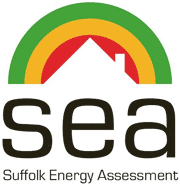phone: (0330) 2020 123; email:
through sustainable solutions
Thermal imaging: services, solutions, support
SEA (Suffolk Energy Assessment) utilizes infrared thermography as a non-invasive method to diagnose the condition of your building's fabric, such as identifying missing insulation, delaminating render, condensation problems, or energy losses in the building envelope.
- Thermal imaging testing allows for air leakage pathways to be identified and for appropriate repairs to be recommended.
- Reducing air leakage will effect enhanced comfort levels and ensure your property is heated more efficiently, conserving energy as well as cutting costs and carbon emissions.
- Thermographs illustrate surface temperature variations that, in turn, provide information on underlying structures and can help to identify energy waste.
- Heat loss in buildings, such as air leakage through chimneys, attics, or poorly fitted windows and doors, can account for up to 50% of a property's total energy consumption.
- Poor construction detailing and damp, defective, or inadequate insulation allow air leakage from the exterior of a property to its interior, or vice versa.
- Scanning with a thermal imaging camera can locate moisture intrusion impossible to see with the human eye.
- Moisture damage is a common type of deterioration to form within walls, floors, or ceilings, while wet insulation takes a long time to dry and becomes a prime site for mould growth.
- Indentifying thermal bridges through infrared imaging will assist in informing improvements such as insulations levels at these locations, as applicable.
Using our survey's infrared images, we can identify defects or other issues within your building's fabric and recommend appropriate thermal performance improvement measures, as applicable. Please contact SEA (Suffolk Energy Assessment) directly to book a thermal imaging survey for your property.
SEA (Suffolk Energy Assessment): services, solutions, support
phone: (0330) 42020 123; email:
(No unsolicited marketing calls or emails.)


